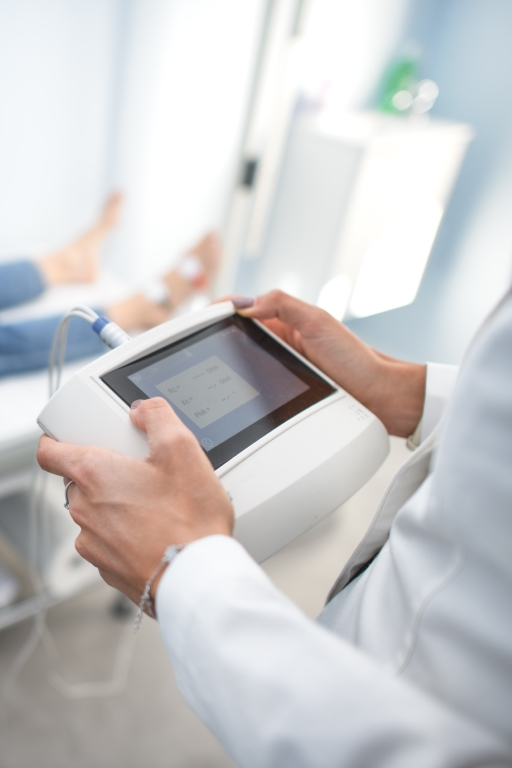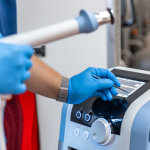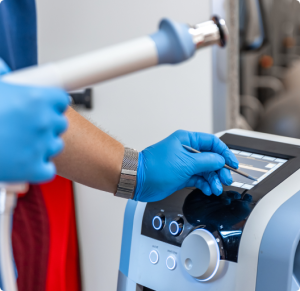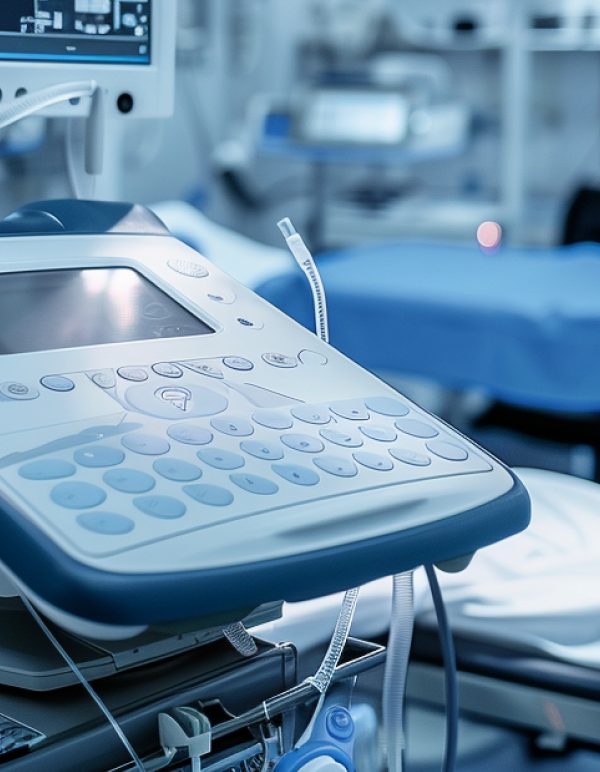
Analytical Testing for IVD Devices
Under IVDR 2017/746, IVD analytical testing ensures diagnostic accuracy and reliability. This includes performance, sensitivity, specificity, and stability evaluations.
- HPV test detection accuracy across all virus strains
- Glucose test reliability across various glucose levels
- SARS-CoV-2 antibody specificity versus other coronaviruses
The role of GCB in reviewing testing evidence
In conformity assessment, a notified body reviews the submitted evidence (including test results) for completeness, consistency, and alignment with the regulatory requirements applicable to the device and the chosen conformity assessment route. The review is based on the manufacturer’s documentation.
What is typically checked in testing evidence
- whether the study scope aligns with the intended purpose and identified risks
- whether methods and acceptance criteria are clearly described
- whether reports are complete and traceable (traceability)
- whether conclusions are consistent with labelling, IFU, and technical documentation
- whether post-market evidence continuity is addressed (PMS/PMCF)
Table of contents
- How MDR and IVDR treat testing
- Common testing groups seen in documentation
- Preclinical testing
- Clinical investigations and clinical evaluation under MDR
- EMC (electromagnetic compatibility) testing
- Electrical safety (IEC 60601-1)
- Usability testing
- PMS and PMCF
- Analytical Testing for IVD Devices
- The role of GCB in reviewing testing evidence
How MDR and IVDR treat testing
Under MDR and IVDR, testing sits within a broader evidence framework: it is used to demonstrate that a device meets safety and performance requirements and that the intended purpose and claims are supported by data. Testing is not the only evidence source, but it often forms the backbone of the technical, biological, clinical, and analytical justification for compliance.
Testing as compliance evidence (evidence)
From a regulatory perspective, test results are evidence that should be consistent with the device description, intended purpose, risk management (ISO 14971 is a widely used reference in this context), and technical documentation. Consistency is also relevant for the instructions for use (IFU), labelling, and any limitations or contraindications stated by the manufacturer.
Testing across the device lifecycle
Evidence is typically built over time: some studies are generated during development and verification/validation, others support clinical evaluation / performance evaluation, and additional evidence is produced after market placement through post-market surveillance (PMS) and post-market follow-up (PMCF). This lifecycle approach implies that evidence is maintained and updated based on real-world experience, product changes, and the current state of the art.
Common testing groups seen in documentation
The areas below are frequently presented as separate “evidence packages”. Not every device requires every testing group—scope depends on technology, risks, users, and intended use—but technical documentation usually includes a clear rationale explaining why certain studies are (or are not) applicable.
- Preclinical testing: biological, chemical, microbiological, mechanical
- Technical testing: electrical safety, EMC, environmental testing, durability, packaging, stability
- Usability testing (usability / human factors, e.g., IEC 62366-1 as a typical reference)
- Clinical evidence (MDR) and performance evidence (IVDR)
- Post-market activities: PMS and PMCF / PMPF (for IVDs)
Preclinical testing
Preclinical testing includes laboratory and technical studies performed before (or independently of) investigations involving humans. It typically covers materials, design, physico-chemical properties, and potential risks arising from contact with the body or from the intended use environment.
Biocompatibility and biological evaluation (ISO 10993)
For devices that come into contact with the human body, biological and toxicological evidence is commonly required (the ISO 10993 family is a frequent reference in this area). Scope depends on factors such as type and duration of contact and the materials used. Results are typically linked to risk management and to the rationale for selecting methods and endpoints.
- Cytotoxicity testing for materials (e.g., implantable devices)
- Irritation / sensitisation assessment for materials
- Toxicity assessment for materials used in catheters or similar devices
Mechanical properties, durability, and resistance
For mechanical devices and implants, studies often address strength, fatigue, wear, and structural stability. Results should relate to the use scenarios and operating conditions stated by the manufacturer.
- Mechanical strength testing of joint prostheses
- Fatigue resistance assessment for implant materials
- Durability testing for moving components in medical equipment
Sterilisation, microbiological quality, and hygiene aspects (where applicable)
Where a device is supplied sterile or specific decontamination processes are relevant, documentation commonly includes studies and validations related to sterilisation, microbial contamination control, cleanliness, and maintenance of sterility over the claimed shelf-life.
- Sterilisation validation and maintenance of sterility in packaging
- Cleanliness / process residuals testing (where relevant)
- Verification of decontamination processes for reusable devices
Packaging, transport, and stability (shelf-life)
For devices sensitive to storage or transport conditions, documentation often includes stability evidence and packaging robustness studies. The aim is to demonstrate that the device maintains required characteristics over the declared shelf-life and under expected logistics conditions.
- Stability and ageing evidence (aligned with the declared shelf-life)
- Packaging resistance to transport damage
- Assessment of temperature and humidity impact on the device
Software and cybersecurity (where applicable)
For devices incorporating software (including SaMD), documentation commonly includes software verification and validation evidence and change control. Typical elements include test reports, architecture descriptions, test scenarios, and rationale for security measures.
- Functional and regression testing reports
- Algorithm validation and version control evidence
- Risk analysis addressing information security and availability aspects
Clinical investigations and clinical evaluation under MDR
Clinical evidence under MDR may be based on different data sources, such as clinical investigations, scientific literature, post-market data, and other justified sources. In practice, the relevance and sufficiency of evidence depends on the device’s intended purpose, target population, and risk profile.
Clinical investigations aligned with ISO 14155
Clinical investigations involving humans are conducted under ethical and methodological principles, with ISO 14155 commonly referenced for medical device investigations. Documentation typically includes a clinical investigation plan/protocol, approvals, monitoring approach, and a final report.
- Effectiveness assessment of vascular stents
- Performance assessment of glucose monitoring systems
- Comparison of new knee implant designs with reference solutions
Clinical evaluation (CER) as an evidence synthesis
Clinical evaluation is a structured process for assessing clinical data related to a device’s safety and performance. Its output is the Clinical Evaluation Report (CER), which typically consolidates and interprets evidence, identifies limitations, and links benefits and risks to the device’s intended purpose.
EMC (electromagnetic compatibility) testing
EMC testing is used to demonstrate that equipment functions correctly in the presence of electromagnetic disturbances and that it does not emit disturbances at levels that would compromise safe use. This is particularly relevant in clinical environments where multiple electrical devices operate simultaneously.
Immunity and emissions
EMC reports commonly describe test conditions, device configuration, acceptance criteria, and outcomes for representative operating scenarios. Results should align with the declared use environment (e.g., hospital, home use, transport).
- Defibrillator testing under electromagnetic disturbance conditions
- Assessment of cardiac monitor stability near MRI systems
- Verification of emissions from mobile X-ray equipment
Electrical safety (IEC 60601-1)
IEC 60601-1 is one of the most frequently referenced standards for active medical devices (electrical medical equipment). In documentation, these tests are presented as evidence of basic safety and essential performance, aligned with the equipment’s function and intended use.
Typical verification areas under IEC 60601-1
- Protection of the patient and operator against electric shock
- Resilience to electrical transients and supply-related phenomena
- Mechanical strength, enclosure integrity, and protective measures
- Operation under specified environmental conditions
Usability testing
Usability testing supports the demonstration that a device can be used safely and effectively by the defined users (e.g., physicians, nurses, patients) in the intended use environment. This area typically integrates design, use-related risk analysis, and verification of the user interface and instructions.
What usability documentation typically includes
Usability reports often describe user profiles, critical tasks, use scenarios, observed use errors, and design updates (e.g., interface, labelling, IFU changes). The objective is to reduce use-related risks and support safe operation.
- Assessment of self-filling syringe performance in emergency conditions
- Intuitiveness testing for infusion pump user interfaces
- Evaluation of non-contact thermometer use under varying conditions
PMS and PMCF
Post-market surveillance (PMS) is the systematic collection and analysis of market data relating to a device’s safety and performance. PMCF is a PMS activity focused on clinical data after market placement, particularly where ongoing confirmation or supplementation of clinical evidence is needed over time.
PMCF as continuity of clinical evidence
PMCF may include observational studies, registries, analysis of real-world use data, and other justified methods that assess safety and performance under routine conditions. PMCF outcomes are typically reflected in updates to clinical evaluation, risk management, and technical documentation.
- Follow-up observation of patients with implanted stents
- Long-term monitoring of new pacemaker models
- Assessment of hearing prosthesis effectiveness after extended use

Analytical Testing for IVD Devices
Under IVDR 2017/746, IVD analytical testing ensures diagnostic accuracy and reliability. This includes performance, sensitivity, specificity, and stability evaluations.
- HPV test detection accuracy across all virus strains
- Glucose test reliability across various glucose levels
- SARS-CoV-2 antibody specificity versus other coronaviruses
The role of GCB in reviewing testing evidence
In conformity assessment, a notified body reviews the submitted evidence (including test results) for completeness, consistency, and alignment with the regulatory requirements applicable to the device and the chosen conformity assessment route. The review is based on the manufacturer’s documentation.
What is typically checked in testing evidence
- whether the study scope aligns with the intended purpose and identified risks
- whether methods and acceptance criteria are clearly described
- whether reports are complete and traceable (traceability)
- whether conclusions are consistent with labelling, IFU, and technical documentation
- whether post-market evidence continuity is addressed (PMS/PMCF)




























